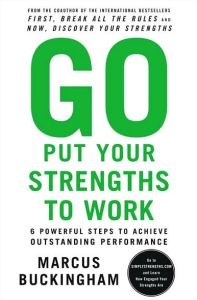
Go Put Your Strengths to Work
6 Powerful Steps to Achieve Outstanding Performance
ISBN: 9780743261678
Pages: 270
Recommendation
Marcus Buckingham is passionate about helping you identify your unique strengths and unleash their power. As you read and work your way through the program in this book, you will become convinced that growing through your strengths is the ticket to your future happiness, effectiveness and success. He refutes the approach of improvement by fixing mistakes as a dead end that cannot help you discover how you can be exceptional. The book constantly refers you to its associated Web site for materials that will help you work through the exercises. Buckingham wants you to act rather than just read a theoretical tract. Nothing presented in this book will help you without action and implementation. However, if you take up the challenge, you will become empowered as you take charge of your work through your strengths. getAbstract recommends this book because it contains just a few simple ideas that could change your life.
Summary
About the Author
Marcus Buckingham is the author and co-author of several best-selling books including First, Break All the Rules; Now, Discover Your Strengths and The One Thing You Need to Know.
















Comment on this summary